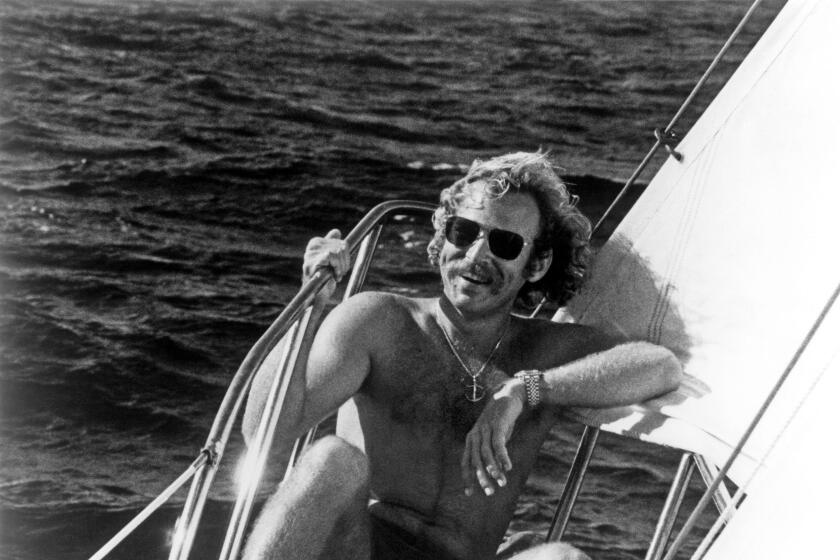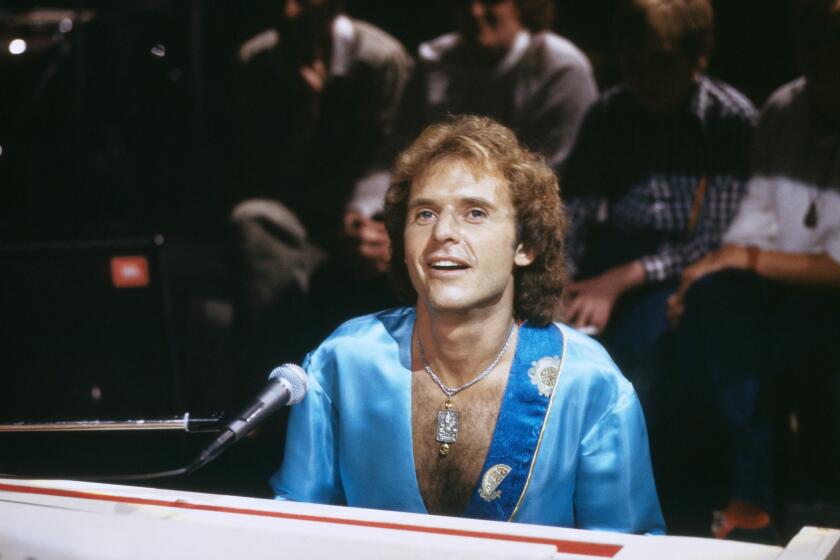Counting Crows’ Adam Duritz on Taylor Swift, Bob Saget and trying to hit that high note in ‘Mr. Jones’
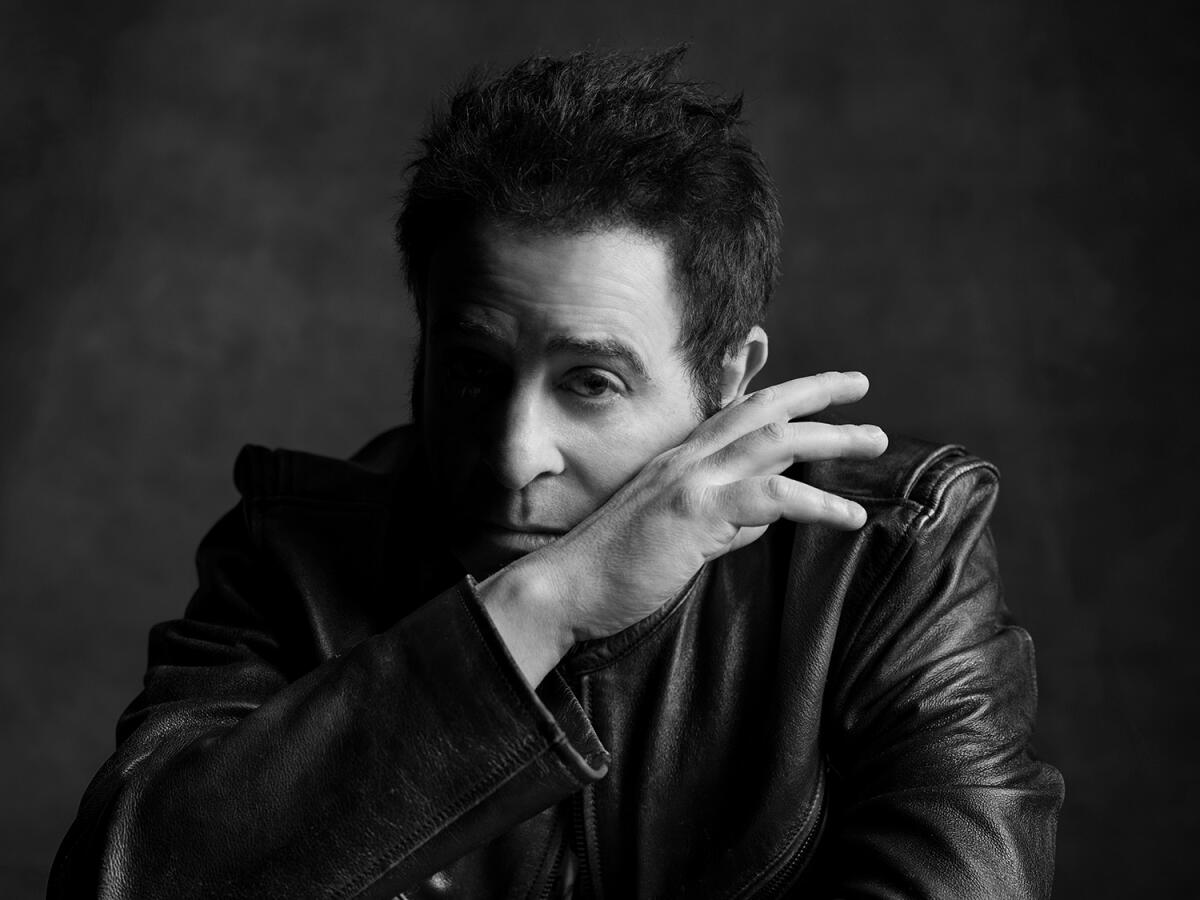
- Share via
In September 1993, Adam Duritz and his Bay Area folk-rock band, Counting Crows, released their debut album, “August and Everything After,” which went on to sell 7 million copies, spawned an inescapable radio smash in “Mr. Jones” and turned the dreadlocked Duritz into one of Hollywood’s most enthusiastic daters of actors (including, as the story goes, two “Friends” cast members in Jennifer Aniston and Courteney Cox).
Three decades later, Duritz is still attracting famous and beautiful women.
On a recent evening, Counting Crows played to a full house at the Troubadour as a means of drumming up excitement for a North American tour that circles back to Inglewood’s YouTube Theater for a show Wednesday night. Among those gathered to hear “Mr. Jones,” “A Long December,” “Round Here” and the rest was Cindy Crawford, whom the next morning Duritz insisted he doesn’t actually know.
“A million people came backstage and said, ‘Cindy Crawford’s at your show!’” the singer, 59, recalled with a laugh in an interview at his West Hollywood hotel. “I was like, ‘Huh, cool.’”
For the current tour, Counting Crows — with a lineup of original members, longtime players and newer recruits — are joined by the veteran emo act Dashboard Confessional, whose Chris Carrabba has become a close friend of Duritz’s in New York, where they both live. In May, Duritz and his girlfriend, filmmaker Zoe Mintz, went to see Taylor Swift’s Eras tour at New Jersey’s MetLife Stadium with Carrabba and his wife.
Duritz’s verdict? “I was floored,” he said.
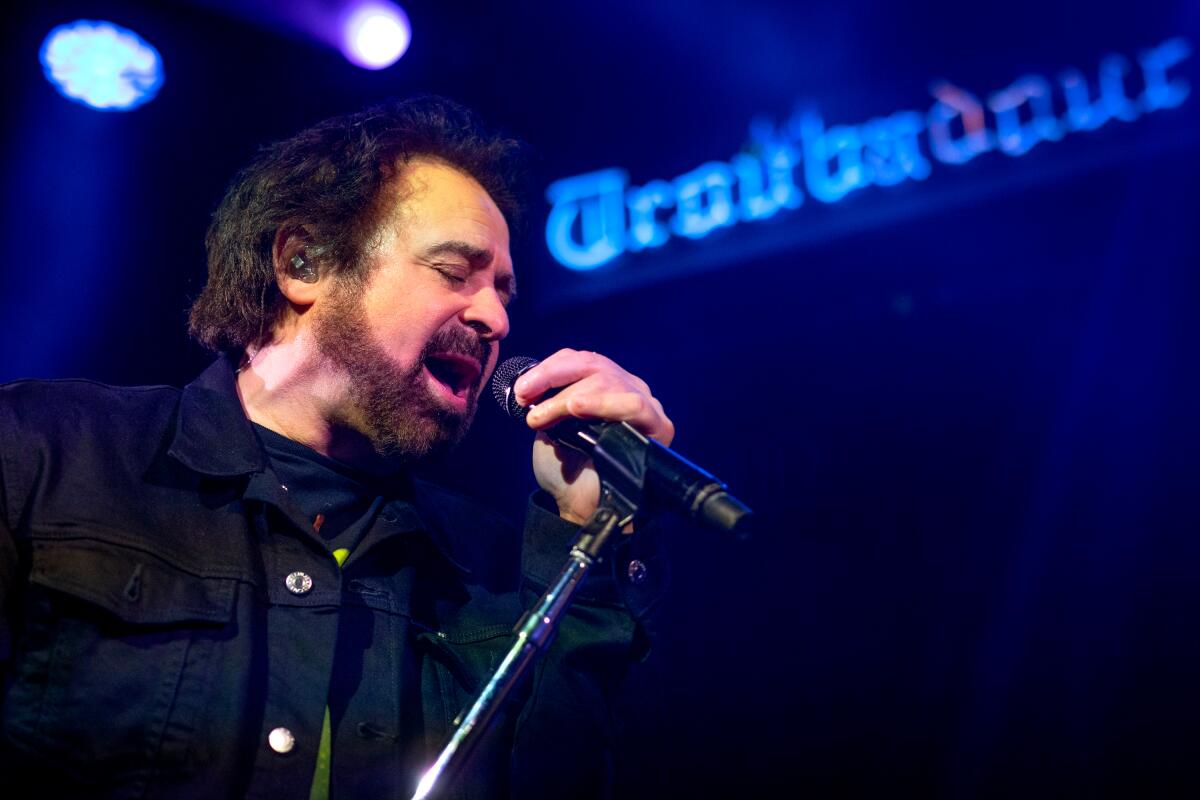
You sound surprised.
Chris knows her really well, and I was a big fan when she started, but I hadn’t listened to her for about 10 years. My girlfriend is obsessed and she got us tickets and she made me a playlist — I couldn’t believe how good the “Folklore” and “Evermore” stuff was. A lot of big shows don’t interest me because it just seems like it’s people plus dancers plus whatever. But this was a work of art — like some combination of Broadway show and Universal theme ride.
I noticed at the Troubadour that you had a music stand with a binder on it. I assume it had song lyrics, but you never once looked at it.
I’ve always had a binder with lyrics sitting at the back of the stage under the piano — just there if I need to look for something. Of course, it’s essentially useless because if I do need to find a lyric, I’m not gonna be able to get under the piano, flip through the binder and find it in time. But after COVID — I mean, two years was the longest I’d gone without playing a gig since I was a kid. And when we got into rehearsals for that tour, I was like, “F— hell, I got a lot of lyrics.” You know, “Palisades Park,” that’s like 10 minutes long. I’m like, “How did I write all this s—? Why did I write all this s—?” So I was just nervous that I wasn’t gonna remember stuff after those two years.
Parrotheads know: Jimmy Buffett was not just a brand, he was a gifted singer-songwriter with a keen understanding of middle age and the American dream.
Last night you let the audience take over for the chorus of “Mr. Jones.” What are you thinking in those moments?
There’s something so galvanizing about an audience singing your song. But “Mr. Jones” — that’s a really high note. I often let the first one go to the audience, but there’s a part of me that thinks: I’m 59 now. They probably think I can’t hit that note anymore. I’m gonna sing the rest of ’em myself. But last night I had no voice — I’m just getting over a chest infection. I knew I wasn’t gonna hit it.
So the haters were right.
In this case, absolutely.

I went back and read some old Counting Crows reviews in The Times. There’s one of a gig you played in Irvine in 1997 that says, “Duritz is one of the few who can make Jackson Browne and Morrissey seem cheery by comparison.”
I’m assuming that wasn’t a great review.
It was not. But does that description square with how you thought of yourself at that time?
Well, I had a pretty severe mental illness that I wasn’t talking about publicly back then. I spent a lot of time depressed, and clearly the writer got that. But it’s a weird thing as an artist to have your life judged solely by people who don’t know you — and with no sympathy, only ridicule. I got myself locked up at the UCLA Medical Center for a little bit [in 2001] because I was having some troubles and just needed to settle things down because I didn’t feel safe. And the day I checked in, Mariah Carey checked out, and I remember the media circus that went on with her and how people made fun of her. That stuck in my head.
How you feeling these days?
Mental illness isn’t like breaking your leg. It’s closer to a handicap than it is to an injury. But at least if you realize what it is, you can spot it when it’s going on. You can go, OK, I’m not crazy — my mind just does this when this happens. And you don’t feel like you’re losing touch with reality. I started to feel safe talking about it around 2008, when we released “Saturday Nights & Sunday Mornings,” because I didn’t feel like I was circling the drain anymore. But I’m not a spokesperson for s—. I don’t really feel the responsibility to be everyone’s flag-bearer for mental illness.
In his weird and luscious signature song, Gary Wright, who died Monday at age 80, captured a vision of tomorrow haunted by the memory of yesterday.
You worked at the Viper Room when you moved to L.A. Why was a well-known rock star tending bar?
When I got home to North Berkeley from the end of the “August” touring — this is like January of ’95 — that first week was kind of a nightmare. There were kids literally camped out on my lawn. I knew [Viper Room owners] Sal [Jenco] and Johnny [Depp], and I got a phone call from them where they started to invite me to something. Then they’re like, “Whoa, what’s wrong?” I explained what was going on and they put me on hold. I’m sure I’ve fictionalized this somewhat, but in my memory they came back five minutes later and said, “OK, you have a reservation on the 7 o’clock flight from Oakland to Burbank. Someone will pick you up at the airport, and we got you a room at the Bel Age. It’s Kate Moss’ 21st birthday — the Viper Room is closed for the night and we’re having a party. You gotta get out of Berkeley.” So I did, and I kind of never went home again. Stayed at the Bel Age for a while, then got a bungalow at the Sunset Marquis. Eventually Shannon, one of the bartenders, found me this house to rent. I’d go to the Viper every night and hang out. They were the only people I knew, really. At some point, Shannon had to go to the bathroom or something and she’s like, “Can you handle this?”
Did you know how to make drinks?
I learned.
Surely people knew who you were.
Which is why it was all the better to be on the other side of the bar. I’m kind of shy, and it gave me something to do. People would come and talk to me and I didn’t have to be wandering around by myself in a crowd. I met girls and I met Allen Ginsberg and William Burroughs and Tom Petty and the Hughes Brothers. Everyone that was doing something interesting in L.A. was there.
Yet you left L.A. in the early 2000s for New York.
I came here from the Bay Area because the struggling artist’s town that I came from wasn’t happy with my success. And L.A. is a working artist’s town. I felt like somebody normal when I got here. But it kind of changed when reality TV came in. There was a culture of famous-for-being-famous that got really tiresome to me. I went to New York and just found myself having more interesting conversations. Mary-Louise Parker is one of my best friends since we were young, and she and Billy Crudup were together then. One night Billy and I went to see Noël Coward’s “Private Lives.” Alan Rickman and Lindsay Duncan were in it. And after the show, we went backstage and had drinks in Alan’s dressing room, then we all went out to dinner and Rosemary Harris came by the table at one point. It was this incredible experience with these older British actors who were really smart and cool, and I just thought, “If I moved to New York, I could have conversations like this.”
Whereas here you could hang out with the cast of “Laguna Beach.”
Or, like, “That ’70s Show.” Who are actually really nice people. Well, the ones that aren’t in jail.

Counting Crows’ first few albums came out on David Geffen’s label. Ever meet him?
Yeah, sure — he was great. After the band blew up, I was summoned out to his house. Got in the car, drove out to PCH, count up to 20,000 or 30,000 or whatever the address was. I ring the doorbell on this wall and eventually this butler guy opens the door: “Oh, Mr. Duritz, please come in.” All at once I see the bright greens of the lawn and the blue of the ocean, and there’s Geffen standing at the end of this long pathway. He greets me and we sit on this patio off to the side of the house and they bring lunch to us, which is like a seared tuna salad. I remember this so vividly because each vegetable in the salad was like the greatest vegetable that had ever been. I’m thinking, “Does he have specialized farming servants who pick each individual tomato?” Just an unreal explosion of salad-ness.
What’d you talk about?
All kinds of stuff. He told me about leaving New York to drive up to Woodstock with Joni [Mitchell], then realizing the traffic was too much but she’s gonna write a song anyways. He told me about working with Jackson [Browne] early on. You know what really struck me? This is a guy who’s done a lot of great s— in his career. But in his mind the greatest thing he ever did was the Eagles. I like the Eagles, but I wouldn’t put them at the top. I’m a Flying Burrito Brothers guy, a Gram Parsons guy. But the Eagles sold a gazillion albums and made more money than all the other acts put together. And that was his greatest accomplishment because for him it’s not just a music thing but a business thing. It was his idea: “You guys aren’t gonna make it on your own — you should make a band together.” It’s like deciding you should do personal computers and starting Apple.
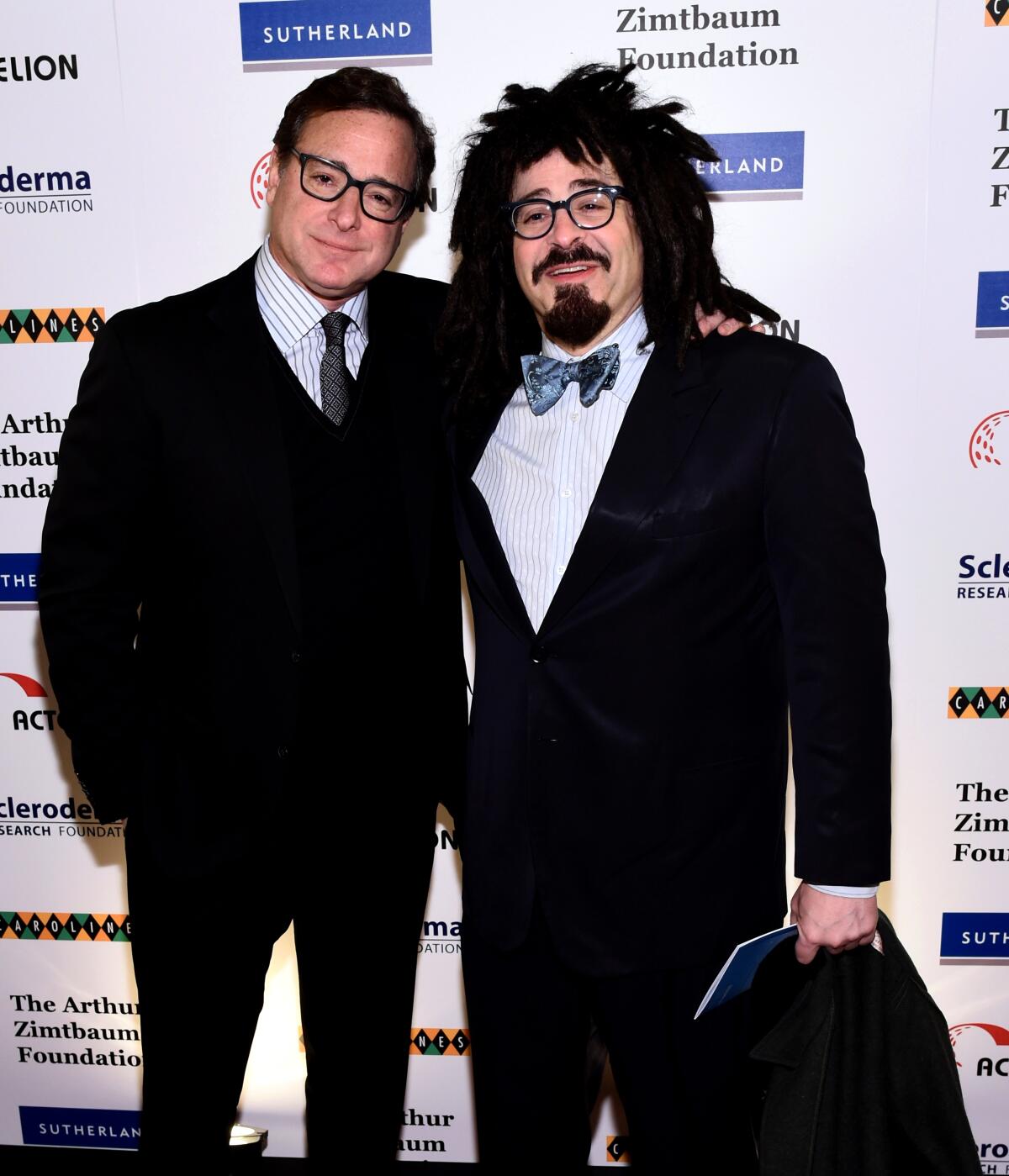
You were close with Bob Saget, who died last year. What was the essence of your friendship?
I met Bob because my goddaughter’s godmother [Lori Loughlin] was on “Full House.” They’d all come to the shows early on. Everyone who knew Bob thought they were Bob’s best friend. He made you feel that way when you were with him, like you were the most important person in the world. It’s weird: I’ve had people in my life die before, but I’m never gonna get over this one. I’ll be in the middle of something and I’ll just wanna talk to him and realize I’m not going to. It’s kind of devastating.
You’ve got other friends in comedy. Ever try stand-up?
I could never do it. It’s the most death-defying performance art there is. I’m in awe at the speed at which those guys’ minds work. I’m a smart guy, but I got nothing on that.
At the show last night you had a Badfinger T-shirt on. Now you’re wearing a Sunflower Bean shirt. How much thought do you put into your choice of band shirt?
Last night I was going between a bright-red Big Star shirt, the Badfinger one and a Bowie shirt with the art from “Space Oddity.” I went with what looked good with my pink shoes.
Do you have a ton of band shirts?
I don’t have anything else. My biggest bummer about getting on the plane to come here was that my girlfriend bought me a Taylor Swift “Midnights” shirt that just was a little too tight, so I didn’t bring it. I gotta lose a little more weight before I can wear it.
It’s good to have a goal.
It’s literally what I’m working towards: to wear the Tay-Tay shirt.
More to Read
The biggest entertainment stories
Get our big stories about Hollywood, film, television, music, arts, culture and more right in your inbox as soon as they publish.
You may occasionally receive promotional content from the Los Angeles Times.

